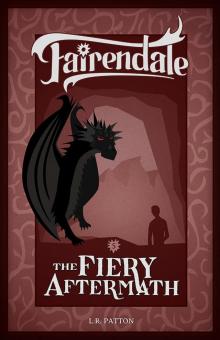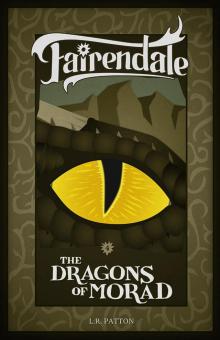- Home
- L. R. Patton
The Treacherous Secret Page 2
The Treacherous Secret Read online
Page 2
What she does not say, what she cannot ever say, is that she and Theo are twins, born the same day. Yes, she is the older sister, by seven whole minutes, but this would not help their case, you see. Twins are rare and extraordinarily powerful, both born with a magic made stronger by the other’s presence.
So if she told the truth, Mercy and Prince Virgil would know that, yes, her brother possesses the gift of magic, and it is a magic that does not need a staff, for it is far more powerful than any other gift.
Hazel widens her eyes more and arranges her face into as truthful a look as she can manage.
“It appeared that you used magic to grab it,” Prince Virgil says. His eyes watch Theo, not Hazel. Fear is not as easy to hide when you are the one in danger. Theo’s eyes tell the real truth, and he cannot change that. So he looks at the ground, not his friend.
“Oh, come, Prince Virgil,” Hazel says. She touches the prince’s arm, but he shakes her off. “He does not even have a staff.” She looks at Mercy, as if pleading for help. “I put it into his hands. Believe me, I would know if my brother had magic.” She takes the puppet from Theo and throws it up into the air, where it hangs suspended again. “You have a face,” she says. “Now you need some hair.”
Mercy plays along. She points her staff at some straw in the street, and it flaps to the puppet’s head. She and Hazel spend the next few minutes searching for street scraps to clothe the puppet, trying not to notice the way the whole mood of their play darkens behind them. Soon enough they turn back to the two boys.
“Your turn, Prince Virgil,” Hazel says. She is laughing again, and when Hazel laughs, it is nearly impossible not to laugh right along with her, which Theo and Mercy do.
Prince Virgil, however, is harder to break. He turns away. “I do not want to play anymore,” he says, but he makes no move to leave.
“Come,” Hazel says. She takes his arm, turns him back around. Mercy sends a burst of magic from her hands, and the puppet starts dancing on the air. The children watch, mesmerized by his twists and turns. It is a he, dressed to look like Arthur, dark brown boots strapped up to his knees, pants the color of the baker’s bread, a sleeve-flapping shirt overlain with a tunic and tied with a bit of string.
Not one of them notices Prince Virgil’s eyes turn mean and hard. Still he smiles and laughs and plays along.
Prince Virgil, you see, carries a secret of his own, a secret no man or woman or child must know. And that secret is clamping down on him right now, blackening his eyes and his vision and, yes, his heart.
Hazel flicks the wrist of the hand holding her staff and sends the puppet flipping, one turn after another. The children laugh again at the awkward piece of wood bending and turning and now walking and running, as if it is a miniature version of their long-legged father.
“Make him talk, Prince Virgil!” Hazel says.
Prince Virgil gives a violent shake of his head.
“Please!” Hazel says. “Do not be a prude.”
“I am no prude,” Prince Virgil says. “I just do not want to play. I must return to the castle now.”
Mercy flicks her wrist, and the puppet’s mouth opens. “Whatever is the matter, Prince Virgil? Lost your magic?” it says.
It takes only a second for Prince Virgil’s hand to reach out and grab the puppet and hurl him to the ground, where he breaks into a thousand wood scrap pieces. Prince Virgil’s friends look at him, their eyes wide. Never before have they seen something like this from their friend Prince Virgil.
He stares back at them, ashamed at this thing he has done, this thing that has, by the looks of it, shocked and perhaps even frightened his only friends in the world. But he is more ashamed of what he cannot do.
“Magic is foolish,” Prince Virgil says in a voice as cold as his eyes, and then he turns away, gripping his staff tighter than ever.
The children watch him until he disappears.
IT is nearly dark. Hazel and Theo sit outside the doors of their home. The cottages of the kingdom do not have porches, only a small patch of earth lined by flowers on either side. This is where the villagers gather at the end of their days, for if there is one thing of superior beauty over all the others in this fair land, it is the last lights of the evening sky. Just as the sun touches the shining gray stone of Fairendale castle’s West tower, it lights the Violet Sea tributary and the whole sky on fire, such as a painting of brilliant colors could never capture. One can only stare. It is a spectacular sight, those oranges and reds and purples both above and below the bridge Prince Virgil crosses every day to see his friends. If one is very fortunate and does not need to blink at the exact moment the sun disappears beneath the land, one will see a ring of water swallow a mermaid’s tail. Those who see it are rumored to have good fortune for all the rest of their days.
The villagers of Fairendale have never seen a mermaid’s tale at that exact moment, for mermaids are sly creatures who do not grant their good fortune to just anyone. The people remain collected on their elaborate lawns until the sun disappears and the sky darkens and all the stars line up in their majestic places. They stare at those stars and breathe their day’s end, and then they return to their homes for the night’s preparations before retiring to sleep. It is the same ritual every night of their lives, yet it never grows old.
Tonight, Hazel and Theo sit a bit removed from their parents, which is not so unusual for children of their age. They do not always want to be where their parents are, but they certainly do not want to miss the night’s soft arrival. Tonight they are talking in whispers, sorting through what happened earlier today in the streets, for they have not had a safe moment until now, the time when their father and mother talk with one another.
“Why do you remain friends with Prince Virgil?” Hazel says. “He is a horrid boy.”
“He is lonely,” Theo says. “He is a prince, from a different world than ours. He is not easy to understand. I suspect we are not, either.”
“All the more reason he should not be here,” Hazel says. It is unusual to hear her talk so harshly as this. You will remember that Hazel is mostly fun and games and good nature, but today’s events have shaken her badly. Fear has a way of turning a heart in quite a new direction sometimes, hardening it in protection, rather than softening it in love.
Theo, however, still loves his friend. “He does not have any friends at the castle,” he says. Theo does not look at his sister but stares instead at the sky. He does not really want to have this argument. Perhaps he should have pulled his chair closer to his mother’s.
“But he is horrid,” Hazel says. “He does not wish to ever have fun.”
Now Theo looks at his sister. His eyebrows pull close to his eyes. “You would never tell me to let anyone else play alone.”
Hazel looks toward the tributary, where she has always hoped she would see a mermaid. Just one glimpse. Just one tail. Just one promise for good fortune all the rest of her days. “I do not like him,” she says.
Her brother does not answer, and even in the fading dark one can see Hazel’s eyes soften. Her brother has been her dearest friend since she was born. “I do not know what it is about him, Theo,” she says. “But there is something that frightens me. It is as if he carries a dark secret. I have seen it, in his eyes, though I do not know what it is.”
“I carry a secret,” Theo says. “So he is like me.” His eyes rest on Hazel’s face. “He is like us.”
“Yes, I suppose he is,” Hazel says. “But I fear he may be more dangerous than we want to believe.”
“That is foolish,” Theo says. “Prince Virgil is our friend. He would never hurt us. He loves us, as we love him.”
Oh, reader. If only being a friend were an accurate measure for good and evil. If only we could know for sure that friends could never hurt us simply because they love us. But we know that is not true. And poor Theo. He will know soon enough.
“You used magic,” Hazel says. “He knows.”
Theo hisses, an effort to qu
iet her. He glances at his parents, still talking. They do not seem to notice anything but each other and the fiery sky. Theo sighs. If his parents heard of his mistake, they would never permit him to play with Prince Virgil again. They would never permit him to sit in the back of his cottage kitchen, pretending to work on whittling but listening to Arthur teach magic to the village girls. They would never permit him to be anything but a boy, and he is more than a boy. So much more.
“I know,” Theo says. His shoulders sag. “I did not intend to do it.”
“You cannot make foolish mistakes,” Hazel says. “Not around a horrid boy like Prince Virgil.”
“Please stop calling him horrid,” Theo says, his voice jagged and prickly. He loves his friend. But he also loves his sister.
“He is the most dangerous of all the village boys,” Hazel says. “You must be more careful.”
“Yes,” Theo says. “I must.” He must. “I will not let it happen again.”
“Especially not around Prince Virgil,” Hazel says, as if she truly wants her brother to understand her urgency, as if he has not already fully understood it, as if, perhaps, he has not comprehended the gravity of such a mistake.
“Yes,” he says again, his whisper just a touch sharper than it had been before. Then, thinking better of his bother, he says, “Thank you for stepping in today.”
“Do you think they believed us?” Hazel says.
“Certainly they did,” Theo says, though he is anything but certain, truth be told. Hazel is a reliable source, which makes her not a great liar. He is not certain at all if their story was believed by anyone who saw his mistake.
Theo and Hazel smile at one another and then turn their eyes to the fading sky and its orange sun, which hangs in a sliver above the fresh-water cove ending the Violet Sea’s reach onto the village grounds. Now is just the moment when the stories say one might see the elusive mermaid’s tale. Theo stares, afraid to blink, until his eyes begin to water, until they burn like the sun did mere moments ago. And all his effort is rewarded, dear reader. Just before his eyelids close, he sees the tail and hears its subsequent splash.
He does not say anything to his sister, who blinked at the exact wrong time.
He keeps this secret to himself.
ACROSS the Violet Sea tributary and the curved gray stone bridge, where flowers burst even through the gaps of rock, Prince Virgil sits all alone, watching the sky long after it has turned dark and the stars come out in earnest. His staff leans against a corner in his room, useless to him. A staff only does what a magician bids it, and Prince Virgil is no magician.
He has only been thinking about what he did earlier today. Only been feeling bad. Only been wrestling with questions and going over and over the events to imagine they had played out any other way.
Magic is foolish? What kind of prince who is supposed to have the gift of magic, who is supposed to be a king in a magical kingdom like Fairendale, says such foolish words? They will surely guess his secret now. What will he do now?
“We will protect the throne,” his father had said the day Prince Virgil tried to do magic like his mother and failed. “We will pretend. No one will have to know. A king does not use his magic, at any rate.” King Willis had sent for all the prophets in the land, from as far away as Guardia, the kingdom in the far, far north that was said to never know warmth, only ice and cold, hoping to discover what was wrong with his son. Queen Clarion’s magic, coupled with his, should have been strong enough to produce a magical son. Why had Prince Virgil been born with no magic?
The prophets all said the same thing. Only the worthy are given magic.
Only the worthy.
His mother had cried. His father had raged. The prophets had looked sadly on, and then the king, flying into the same fit of rage he always did when the prophets pronounced their diagnosis, which was nothing new to anyone in the royal family, threw the prophets into the dungeon for their efforts. After the prophets had left his presence, Prince Virgil, every time, would watch the king pace the throne room, pontificating on the injustice of magic and how a royal line should be secured by blood rather than a silly gift, appearing to forget altogether that magic was how His Most High King had gained the throne in the first place. King Willis would talk until his wife quietly reminded him that if they wanted to keep this knowledge a secret from the kingdom, they must silence their monologues. By “they,” of course, the queen meant King Willis. She was a woman of few words, where her husband was a man of many.
“What kind of king is born without magic?” King Willis whispered when the one hundred forty-second prophet—a bent, white-haired old man—came to tell them what they had already heard from so many before. King Willis entertained them all, after the first several, only because he hoped that someone would bear different, better news—that his son did, in fact, have magic. It had merely taken a number of years to show itself. But, alas, there was no cure for “born without the gift of magic,” and King Willis, to preserve his own skin and that of his son, threw them all into the dungeon beneath the dungeons, a place no man would willingly go. No man, that is, except the trusty assistant cook Calvin, who is sent every morning at 7 o’clock and again at 6 o’clock in the evening to deliver bread and water to the prisoners. The prisoners have learned to ration their nourishment in the hours between.
Fairendale and the lands beyond hold no more prophets now. They all live in the darkest place one can imagine, a place where eyes grow accustomed to seeing nothing. And, sadly, their hearts have grown accustomed to waving away hope, for there is none to be found for a man in the dungeon below the dungeons. No one but Calvin and the royal family, and, perhaps, the captain of the king’s guard, even know they exist.
Why does the king keep them? Why does he not kill them? Well, now, our king is not so heartless as that. He does not want the blood of one hundred forty-two prophets on his hands. There are stories, of course, stories about what happens to a man who might kill a prophet. Our king does not wish to discover for himself whether those stories are indeed true. So he gives his prisoners water and feeds them, twice a day. And they live. Though we might all agree they do not really live at all.
Prince Virgil thinks of them sometimes, trapped in the same cell, pressed against each other in the cold, unable to see one face from another. He has never been to the dungeons below the dungeons, but he imagines it a frightful place, as any place too far for light to reach it would very well be.
“Virgil,” Queen Clarion says. He turns to the doorway, where she stands in shadows. Her eyes look black from here, though he knows them to be the deepest blue of the evening sky. “What are you doing out here?”
“Watching the sunset, Mother,” he says.
She laughs. “The sunset finished hours ago, dear.” Queen Clarion steps out onto the stone balcony, her hand searching for her son’s shoulder. It is dark on his private terrace, for he has so lost himself in his thoughts that he has forgotten to light the torches.
Her hand warms his skin. His mother always feels warm to him, perhaps from all the kindness that lives inside her. She is the kindest woman Prince Virgil has ever known, outside of Maude, who is much older and much less beautiful than his mother.
Queen Clarion visits her son’s chambers every night to bid him goodnight. Though most queens leave their children to others, Queen Clarion has always loved her boy with a fierce love that does not depend on whether or not he carries the gift of magic. She does not care that she gave up her great gift, as every magical parent must, so that he could get nothing. He is her son. That is the only story a mother’s love tells.
She touches Prince Virgil’s curls. He tilts his head onto her shoulder, which he almost never does anymore. He is a boy of twelve, after all. The unexpected gesture makes his mother drop a kiss to the top of his head.
And that is what makes Prince Virgil feel safe enough to question, to work out his bothers, to lay them at the feet of one who loves him with a love that might very well listen
. This question has been torturing him all night, stinging him as the wind that gusts from the north never could. “Are you disappointed you gave up your gift of magic for me?” he says.
If one could see her lovely face in all the shadows, Queen Clarion would not look the least bit surprised. She is a good mother. She has already guessed what has kept her boy out on his balcony long into the evening. She knows he has spent his day with magical children in the village. She knows he does not understand the reasons for a boy born without magic. She knows that he wishes he could have this gift, more than he has ever wished another thing in all the world.
“No,” she says. “I am not disappointed in the slightest.” Her voice is sure and solid and strong. He breathes the relief it brings.
And then he says, “Why was I born without magic?”
She does not answer immediately. Her eyes fix on the dark sky, a painting of tiny pinpoints of light. But Prince Virgil notices, because he is looking, that she is no longer smiling. “We do not know why,” she says, but there is something that happens when Queen Clarion lies. At least Prince Virgil suspects it happens when she is lying, for he has only seen it once before, when he asked about his Uncle Wendell and why he was banished from the kingdom of Fairendale, and his mother answered simply, “He was not a wise man.” The lids of his mother’s eyes get the slightest bit thicker, her lips the slightest bit thinner. It would take an observant child to notice such small details. Prince Virgil has always been one of those.
“But you and Father had magic,” he says. “Why do I not?”
“Well,” his mother says. “Well.”
They are quiet for some moments. Prince Virgil wonders if she is ever going to answer, and then Queen Clarion turns to her son and takes both his hands in hers. “I think it is time we talked with your father,” she says. She drops his hands and moves gracefully, as she always does, back into the deeper shadows just outside Prince Virgil’s balcony door, where a woman like Queen Clarion is prone to standing. It is not right, reader, of course it is not, but in Fairendale, the virtues that Queen Clarion carries deep inside—gentleness and kindness and love—are not the virtues that are said to be the right ones, the ones that can rule a kingdom well. The powerful virtues in this upside-down kingdom—ruthlessness, selfishness, perfidy—those are the characteristics that give a kingdom to a man like King Willis.

 The Perilous Crossing
The Perilous Crossing The King's Pursuit
The King's Pursuit The Fiery Aftermath
The Fiery Aftermath The Dragons of Morad
The Dragons of Morad The Treacherous Secret
The Treacherous Secret